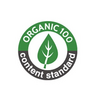
In- conversion OCS
About (In- conversion OCS)
The In-conversion Organic Content Standard (OCS) is a voluntary global standard that establishes criteria for third-party certification of organic materials and their chain of custody. It serves to promote and incentivize organic agricultural production while enabling companies to verify their claims regarding organic content.
The primary objective of the OCS is to encourage farmers to transition to organic farming practices by providing them with a certification framework. By meeting the OCS requirements, farmers can demonstrate their commitment to organic agriculture and access markets that prioritize organic products. The standard also helps companies ensure the authenticity and credibility of their organic claims.
The OCS includes a label grade called "organic in conversion," which signifies that the organic material being used is sourced from farms in the process of transitioning to organic practices. This label grade is only permitted when the underlying production standard allows it. This recognition acknowledges the efforts of farmers during the conversion period and supports the expansion of organic agriculture.
When a product is OCS certified, it guarantees the traceability and integrity of the organic raw materials throughout the entire production chain. This certification provides assurance to consumers that the organic content in the product has been verified by an independent third-party and meets the OCS requirements. It promotes transparency and confidence in the organic supply chain.
The OCS certification is applicable to textile products that are made from organic raw materials. This encompasses a wide range of products, including garments, home textiles, accessories, and more. By adhering to the OCS standards, textile manufacturers can communicate their commitment to organic sourcing and provide consumers with reliable information about the organic content of their products.
Overall, the In-conversion Organic Content Standard (OCS) plays a crucial role in promoting and supporting the growth of organic agriculture. It provides a recognized certification framework for farmers and companies, facilitates the verification of organic claims, and ensures the traceability and integrity of organic materials throughout the production chain. By choosing OCS certified products, consumers can make informed choices and contribute to a more sustainable and organic future.